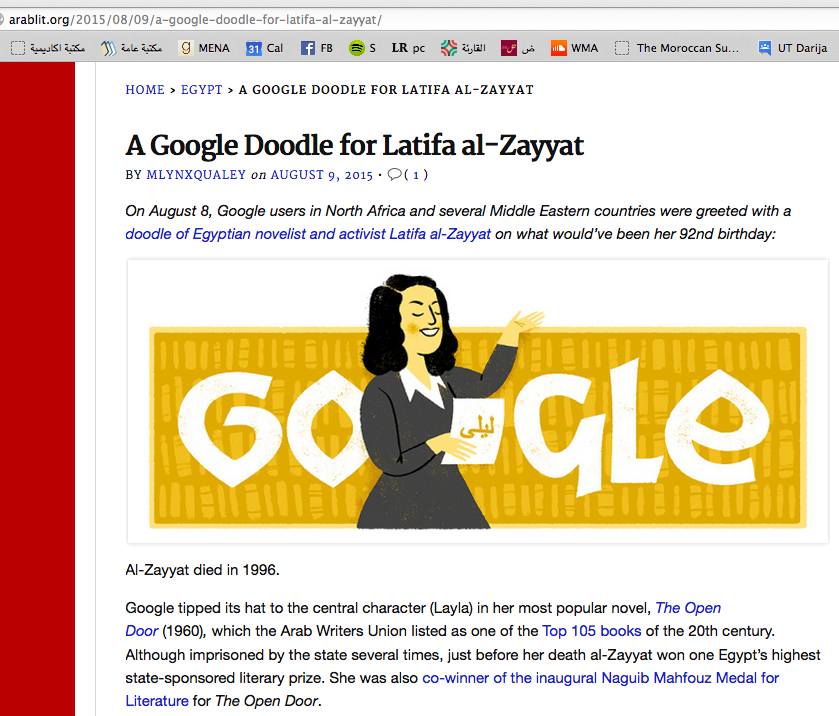‘The Open Door’: A Classic Revisited
This post celebrates and complements our first group read of 2018 in the Middle East North Africa Lit group on Goodreads.com: الباب المفتوح / The Open Door by Latifa al-Zayyat! This is one of the most enjoyable feminist classics in all of Arabic literature, as far as I’m concerned. As a historical novel, it transports us to a time when Cairo was part of the British empire, and Egyptians were ready for a change! The protagonist, a young woman, comes of age in this society. We accompany her through all her discoveries – her newfound nationalism and political consciousness, her developing sexuality and womanhood / feminist consciousness, and her search for a path all her own.
AUC Press re-issued the English translation of The Open Door by Marilyn Booth in 2017. See here for a generous free excerpt and more information.

Here is a bilingual site dedicated to Latifa al-Zayyat’s work.
See our moderator Marcia Lynx Qualey’s article here on the 2015 Google Doodle for Latifa al-Zayyat.
 ‘The Open Door‘ is also a classic film from the sixties generation, based on the eponymous feminist novel by Latifa Zayyat. If you want a black-and-white cinematic experience, from the days of the silver screen, that envisions independence for Egypt and for individuals, then this is your movie!
‘The Open Door‘ is also a classic film from the sixties generation, based on the eponymous feminist novel by Latifa Zayyat. If you want a black-and-white cinematic experience, from the days of the silver screen, that envisions independence for Egypt and for individuals, then this is your movie!
In this recent interview, a professor at Brown University discusses teaching The Open Door in her class, Women’s Writing in the Arab World.
Finally, if you want to continue reading more by Latifa Zayyat, her short story “The Narrow Path” is available in English translation by Salwa Jabsheh and Christopher Tingley on pages 790-800 of Modern Arabic Fiction: An Anthology (2008), edited by Salma Khadra Jayyusi.
وكان عندي مناقشة مفتوحة بالعربية عن هذه الرواية
My Review: الباب المفتوح by Latifa ZayyatMy rating: 5 of 5 stars
الباب المفتوح by Latifa ZayyatMy rating: 5 of 5 stars
This is one of the most inspiring feminist classics of all time, as far as I’m concerned. As a historical novel, it transports us to a time when Cairo was part of the British empire, and Egyptians were ready for a change! The protagonist, a young woman, comes of age in this society. We accompany her through all her discoveries – her newfound nationalism and political consciousness, her developing sexuality and womanhood / feminist consciousness, and her search for a path all her own.
It is no coincidence that there is a reissuing of this book, and a resurgence of interest in it, when the issues that it presents are still unresolved and current: women’s freedom, personal freedom, and national freedom. Women are discussing freedom loudly through movements such as #metoo. Nearly everyone is discussing personal freedoms (to worship, to bear arms, to express ideas, to work, to not work, to choose a spouse, to not choose a spouse, to have children, to not have children, etc.). Like all the rest of us, Latifa Zayyat’s Egypt is still seeking the freedom of which she dreamed.
I find myself returning to this book every several years to reimagine freedom, and to revisit Layla’s personal journey. Layla is passionate and imaginative like Anne of Green Gables, although she becomes as practical and disillusioned as Dicken’s Mr. Gradgrind. Ultimately she finds her path and her inner strength.
During this reading, I found myself struggling with two aspects of the book: nationalism and the dream man. I found most benefit Layla’s nationalism when I read it as something bigger than herself. I don’t believe that Zayyat wanted to advocate the kind of nationalism that overshadows our shared humanity. Instead, she was imagining a more just and free Egypt, a more just and free society. As for the dream man, unfortunately Layla’s partner Hussein is a very flat character. I recommend looking to her brother Mahmoud for a more interesting portrayal of the male ally complete with complicated double standards, hypocrisy, and the struggle to allow one’s actions to reflect one’s truths. Together Layla, Mahmoud and the other characters make their way to the threshold of the open door, pointing us along our own paths toward greater freedom and community.
